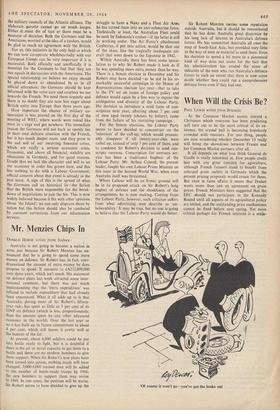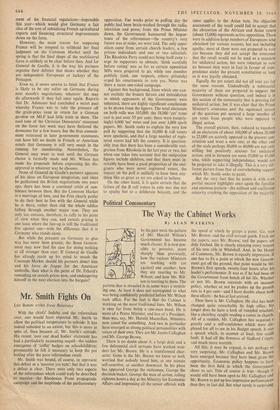When Will the Crisis Be?
PAUL LEWIS writes from Brussels:
As the Common Market moves toward a Christmas which everyone has been predicting will turn out to be the most critical of its ex- istence, the crystal ball is becoming hopelessly crowded with -rumours. For one thing, people are now wondering whether December 15 really will bring the showdown between France and her Common Market partners after all.
It all depends on what you think General de Gaulle is really interested in. Few people credit him with any great concern for agriculture, although French farmers stand to benefit from enlarged grain outlets in Germany which the present pricing proposals would create for them. But even in farm affairs it seems that France wants more than just an agreement on grain prices, French Ministers have suggested that the EEC should not participate in the Kennedy Round until all aspects of its agricultural policy are settled, and the outstanding price mechanisms cannot be fixed before next spring. Yet more critical perhaps for French interests is a settle-
'Of course it won't go—you've got the brake on!
meat of the financial regulations—impossible this year—which would give Germany a fair slice of the cost of subsidising French agricultural exports and financing structural improvements down on the farm.
However, the main reason for supposing France will be tempted to withhold her final judgment on the Common Market until the spring is that the final shape of the multilateral force is unlikely to be clear before then. And for General de Gaulle, it is the way his partners organise their defence that shows whether they are independent Europeans or lackeys of the Pentagon.
Even so, it seems unwise to think that France is likely to be any softer on Germany during next month's negotiations, whatever she may do afterwards if they fail once again. Reports that Dr. Adenauer had concluded a secret pact whereby France was to take the pressure off the grain-price issue in return for a German go-slow on MLF had little truth in them. The cool tone of the Christian Democrats' statement on the force last week may have fluttered the dovecotes for a few hours, but the firm commit- ment reiterated in later government statements can have left no doubt in French or American minds that Germany is still very much in the running for membership. Nevertheless, the General may want to wait until the German choice is formally made and Mr. Wilson has made his proposals before expressing his dis- approval in whatever way he chooses.
None of General de Gaulle's partners approve of his ideas on European integration, and since he guillotined the British negotiations two years ago, there has been a continual crisis of con- fidence between them. But the Common Market is a Marriage of love, and the Five clearly prefer to do their best to live with the General while he is there, rather than risk the whole edifice falling through another major row. They are only too anxious, therefore, to rally to his point of view when they can, and cereals pricing is one issue where the line-up is still the traditional -five against one—with the difference that it is Germany who stands alone.
But while the pressure on Germany to give way has never been greater, the Bonn Govern- ment may now find the case for doing nothing at all stronger than ever. If General de Gaulle has already made up his mind to smash the Common Market should his partners desert him and his force de frappe for the American umbrella, then what is the point of Dr. Erhard's conceding on cereals prices now, and endangering himself in the next election into the bargain?



































 Previous page
Previous page